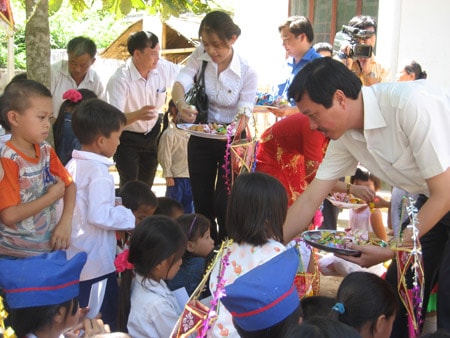Oh Oh and Gia Hop still have many difficulties
(Baonghean) -For a long time, the two villages of O O and Gia Hop in Tuong Son commune (Anh Son) have been known to many people for their poverty, deprivation and backwardness. These are two Thai ethnic villages (nearly 150 households) located nearly 15 km from the commune center.
Up to now, the poverty rate of these two villages is still above 50%, among which there are many households that are constantly hungry and have to live in temporary, dilapidated houses. The basic cause of poverty is that people still have a heavy mentality of waiting and relying, lack of investment and do not know how to apply science and technology in production. That is not to mention that some households facing economic difficulties have sold their fields and production land to people from other regions and then continue to clear fields and reclaim land. But land and forest capital is limited, so many households fall into a serious shortage of production land, many people have to work for a living.

Nghe An Young Entrepreneurs Association gives gifts to poor children in O O and Gia Hop villages
In addition, the people of O O and Gia Hop still suffer many disadvantages from social security policies. Because up to now, the people of Gia Hop village and about 1/3 of O O village still do not enjoy light from the national grid. 2/3 of the households of O O village have to contribute their own money to invest in building a power line system from the Youth Volunteer Force to the village, due to many reasons, these households still have to use electricity at a higher price than normal. Located far from the center, the people of O O and Gia Hop still have many difficulties in accessing medical services and health care. In particular, one of the most difficult and difficult problems for the people here today is still education. Because there are only branches of primary and preschool schools here, there is no branch of secondary school. Children of O O and Gia Hop who want to continue their studies at secondary school must go to the commune center, while the commune secondary school does not have a dormitory, so going to school is difficult. This leads to the consequence that the educational level of the people here is always low, and the application of scientific and technological advances in production is difficult. The problem of hunger eradication, poverty reduction, and improving the educational level of the people here has not yet found a solution.
People of O O, Gia Hop, said: "In meetings with voters, we have repeatedly made recommendations to People's Council representatives at all levels about infrastructure and social welfare, but so far there has been no response." We think that authorities at all levels need to pay more attention to helping the Thai ethnic people here develop their socio-economy, gradually escape poverty, and improve their material and spiritual lives.
Cong Kien






